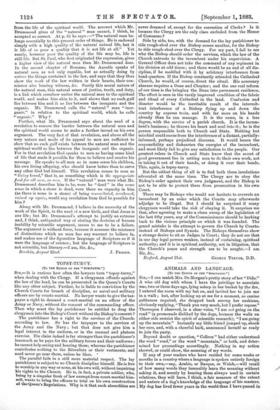TOPSY-TURVY.
[To Mg EDITOR OF THE "SPECTATOR."]
SIR,—It is curious how often the lawyers tarn "topsy-turvy," when dealing with the Clergy. If a clergyman offends against the law of the land, he can be prosecuted in the Queen's Courts like any other subject. Further, he is liable to conviction by the Church Courts for breach of discipline, as naval and military officers are by courts-martial. No lawyer wants to give the tax- payer a right to demand a court-martial on an officer of the Army or Navy, without the consent of the commanding officer. Then why must the lay parishioner be entitled to drag the clergymen into the Bishop's Court without the Bishop's consent The parishioner has a right to the services of the Church, according to law. So has the taxpayer to the services of the Army and the Navy ; but that does not give him a legal interest in the uniform, or in the manual and platoon exercise. His claim indeed is far stronger than the parishioner's inasmuch as he pays for the military forces and their uniforms ; he cannot help seeing and hearing them; whereas the parishioner contributes nothing to the Ritualists or their vestments, and need never go near them, unless he likes.
The parallel fails in a still more material respect. The lay parishioner is subject to no Church discipline himself. He is free to worship in any way or none, at his own will, without impairing his rights to the Church. He is, in fact, a private soldier, who, being by a singular freak of law exempt from court-martial him- self, wants to bring the officers to trial on his own construction of the Queen's Regulations. Why is it that such absurdities are
never dreamed of, except for the correction of Clerks ? Is it because the Clergy are the only class excluded from the House- of Commons ?
Side by side, too, with the demand for the lay parishioner tee ride rough-shod over the Bishop comes another, for the Bishop- to ride rough-shod over the Clergy. For my part, I fail to see why the Bishop should order the services, which the law of the Church entrusts to the incumbent under his supervision. A General Officer does not take the command of any regiment in his division at odd times ; and there would be an end of all dis- cipline, if he meddled with it by arbitrary interference from head-quarters. If the Bishop constantly attended the Cathedral' Church, he would, of course, direct the ritual. His necessary absence requires a Dean and Chapter ; and the one real reform of our time is the bringing the Dean into permanent residence. The effect is seen in the vastly improved condition of the fabric- and ritual of every Cathedral in the land. Confusion and disaster would be the inevitable result of the intermit- tent interference of a Bishop flying up and down the. country by express train, and with far more on his hands- already than he can manage. It is the same, in a less- degree, with the service of a parish church. It is the incum- bent's business ; he throws his heart and soul into it ; he is the- person responsible both to Church and State. Nothing but mischief could ensue from the interference of a distant, partially- informed, perhaps prejudiced diocesan. It would lessen the responsibility and dishearten the energies of the incumbent, and most likely fail to give any satisfaction to the people. Our greatest rulers in Church and State know that the secret of good government lies in setting men to do their own work, not in taking it out of their hands, or doing it over their heads.. This, again, is topsy-turvy.
But the oddest thing of all is to find both these involutions advocated at the same time. The Clergy are to obey the Bishop's order against their own judgment, and the Bishop is not to be able to protect them from prosecution in his own Court.
There may be Bishops who would not hesitate to overrule an incumbent by an order which the Courts may afterwards adjudge to be illegal. But I should be surprised if many clergymen would take the risk of obeying it. It surprises me that, after agreeing to make a clean sweep of the legislation of the last fifty years, any of the Commissioners should be harking back to the vicious principle on which it was founded. The grand mistake is the attempt to govern the Church by Courts, instead of Bishops and Synods. The Bishops themselves show a strange desire to sit as Judges in Court; they do not see that in our day legal powers weaken, instead of sustaining, spiritual authority; and it is in spiritual authority, not in litigation, that the Church's peace and strength are to be sought.—I am. Sir, &c.,


































 Previous page
Previous page